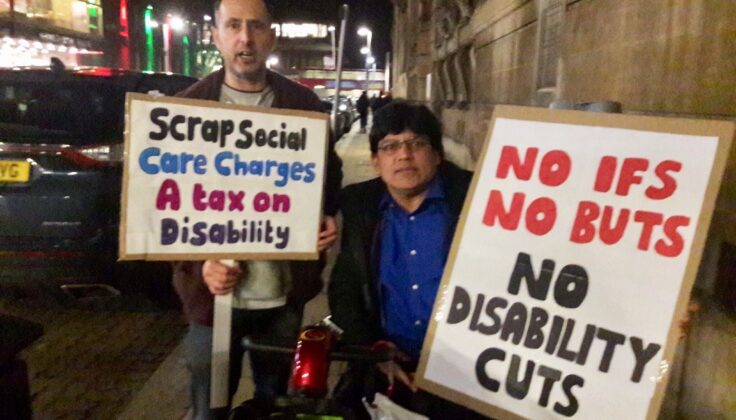Means Tested Misery: Inclusion London Demands Action on Care Charging
Letter to The Rt Hon Helen Whately MP, Minister for Social Care, expressing grave concerns about social care charging

To The Rt Hon Helen Whately MP
Minister for Social Care
Department of Health and Social Care
39 Victoria Street
London
SW1H 0EU
United Kingdom
24 January 2023
Dear Minister,
I am writing to raise our grave concerns about the combined detrimental impact of social care charges and the significant increase in the cost of living on the already high levels of poverty among social care users, whose income comes solely from means-tested and disability benefits. This large cohort of social care users are currently forced to contribute up to half of their income to cover statutory care in the community with dire consequences for their ability to eat, heat and operate the essential equipment they need, whilst also remaining debt free.
We therefore urge you to take the steps detailed in this letter below to enable asset-poor Disabled social care users on low income to maintain a dignified life and have enough money to meet basic, essential living costs.
The scale of the problem
In the current environment, with costs of energy and essential goods being high, Disabled people, who are entitled to statutory social care, are now confronted with an increasingly impossible choice between keeping essential statutory care or covering basic living costs including energy costs to heat their homes, power their essential equipment, such as wheelchairs, ventilators and putting food on the table.
More and more Disabled people are being pushed into debt as a consequence, with analysis carried out in spring 2022 identifying around 90,000 social care users who were already unable to keep up with their care contributions[1].
Disabled People’s led organisations witness every day the significant detrimental impact on Disabled care user’s physical health, wellbeing as well as rising rates of mental distress created by trying to survive in poverty caused in large part by disproportionate and increasing Councils social care charges. We are certain, this unacceptable situation will in turn lead to an escalation of health and social care needs, and therefore costs, in the medium to long term. This dire situation also leads to increased social exclusion, disempowerment and isolation and significantly limits Disabled people’s ability to live independently. This is particularly acute for Disabled people with high support needs, who are unable to work and supplement their income.
Changes are urgently needed to the income related part of social care contributions means-test. These include uplifting the level of Minimum Income Guarantee and allowing people to keep their extra costs benefits.
Uplifting Minimum Income Guarantee – MIG
MIG was frozen between 2016 and 2022 and as a result lost around 20% of its real value. Static MIG levels meant that Disabled people who use social care did not benefit from disability or means-tested benefits uplifts, as these were taken back by local authorities in increased charges.
In September 2021, when announcing the social care charging reforms, the government recognised “real financial pressure” caused by inadequate MIG levels and committed to unfreezing it[2]. Subsequently, it was increased by 3.6% in 2022[3] and by 10% in 2023.
We urge you to maintain this commitment and increase MIG, at least in line with inflation in 2024 and subsequently.
Letting people keep their extra costs benefits
We find it particularly shocking that part of the income claimed by Local Authorities towards social care charging comes from Disabled social care users’ extra costs disability benefits. This directly results in people not being able to meet their extra disability related costs[4].
The current system of Disabled people being able to disregard ‘Disability Related Expenditure’ is inaccessible, unworkable and bureaucratic. It creates a post code lottery, and disadvantages people with the most complex needs and those who are not able to independently advocate for their rights. It also creates inequality between those Disabled people who do not receive social care support and are able to spend their extra costs benefits as they see fit, and those who do, as they have to prove and justify their extra costs to keep their money. Extra costs disability benefits are considered as a protected income in most means-testing processes when determining eligibility for other public services. We strongly believe that social care should not be an exception and benefits like PIP, DLA and Attendance Allowance should be excluded from income for social care charging means-testing.
We understand the national government only sets minimum standards and local authorities have discretion to introduce higher levels of MIG and therefore enable people to keep more of their disability benefits. However, in practice this does not happen and an increasing number of local authorities are reducing the amounts they leave people with, choosing instead to mirror the minimum set by the government[5].
Our asks
Secretary of State, we urge you to show your leadership and compassion in addressing this grave and unjust situation by:
- Ensuring MIG levels remain unfrozen and are increased, at least in line with inflation for 2024-2025, as happened last year;
- Suspending local authority’s power to recover social care debt from asset-poor Disabled people whose income comes only from means-tested and extra costs benefits.
- Excluding extra costs disability benefits such as DLA, PIP and AA from income for the purposes of social care means-testing.
I would be happy to meet and discuss with you or your colleagues the concerns raised in this letter.
Yours sincerely,
Tracey Lazard,
CEO
Inclusion London
[1] https://www.opendemocracy.net/en/cost-of-living-social-care-bills-people-cant-pay-exclusive-england/
[3] https://www.gov.uk/government/publications/social-care-charging-for-local-authorities-2022-to-2023
[4] Scope estimated on average those are £583 per month and 1 in 5 Disabled people facing the cost of over £1000, https://www.scope.org.uk/campaigns/extra-costs/disability-price-tag/